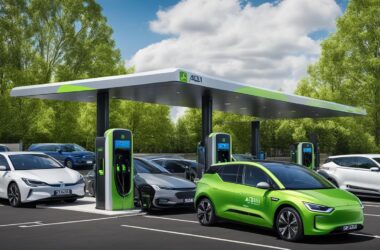The automotive landscape in the United Kingdom is experiencing a revolutionary shift with the growing prominence of electric cars. With the government’s ambitious goal of banning new petrol and diesel cars by 2030, the future of electric vehicles (EVs) in the UK is promising and multifaceted.
Government’s Green Vision
A pivotal force behind the surge in electric cars is the UK government’s commitment to combat climate change. In 2020, Prime Minister Boris Johnson unveiled a comprehensive ten-point plan for a “green industrial revolution,” with a key objective of banning traditional fuel vehicles by 2030. This commitment has spurred increased investments in the development and adoption of electric vehicles.
Charging Ahead: Infrastructure Development
Supporting the widespread adoption of electric cars hinges on a robust charging infrastructure. The UK government is allocating funds to expedite the expansion of charging networks. Accessible charging points in urban areas, along highways, and at workplaces are on the rise, facilitating convenient charging for EV owners. Emphasis is not only on increasing the number of charging stations but also on enhancing charging speeds to significantly reduce charging times.
Powering Progress: Technological Advancements
Crucial to the success of electric cars, advancements in battery technology have seen significant progress. Increased battery capacity translates to longer driving ranges, coupled with reduced charging times. Ongoing research focuses on addressing challenges such as battery degradation and resource sustainability. The advent of solid-state batteries holds promise for further improving EV performance and sustainability.
Driving Change: Economic Incentives
The UK government offers various financial incentives to encourage consumers to embrace electric cars. Grants for EV purchases, reduced taxes for electric car owners, and exemptions from congestion charges in specific areas enhance the financial attractiveness of electric cars, contributing to their growing popularity among consumers.
Green Revolution: Environmental Benefits
A paramount advantage of electric cars is their positive impact on the environment, producing zero tailpipe emissions. Aligned with the UK’s climate goals, widespread adoption of electric cars plays a crucial role in reducing air pollution and combating climate change. Electric cars not only operate cleanly but also contribute to a more sustainable transportation ecosystem.
Challenges and Opportunities
While the future of electric cars in the UK holds promise, challenges persist. Further infrastructure development, addressing environmental concerns related to battery production, and enhancing EV affordability for a broader demographic are ongoing areas of focus. These challenges, however, present opportunities for innovation and collaboration within and beyond the automotive industry.
Conclusion: Driving Toward a Sustainable Future
The future of electric cars in the United Kingdom marks an exciting journey toward a sustainable and eco-friendly transportation system. Government initiatives, infrastructure development, technological advancements, economic incentives, and the environmental benefits collectively paint a positive picture for the electric vehicle market. As the automotive industry evolves, electric vehicles are poised to lead the charge in shaping the future of transportation in the UK—an evolution not only in technology but also a commitment to a cleaner and greener future for generations to come.










